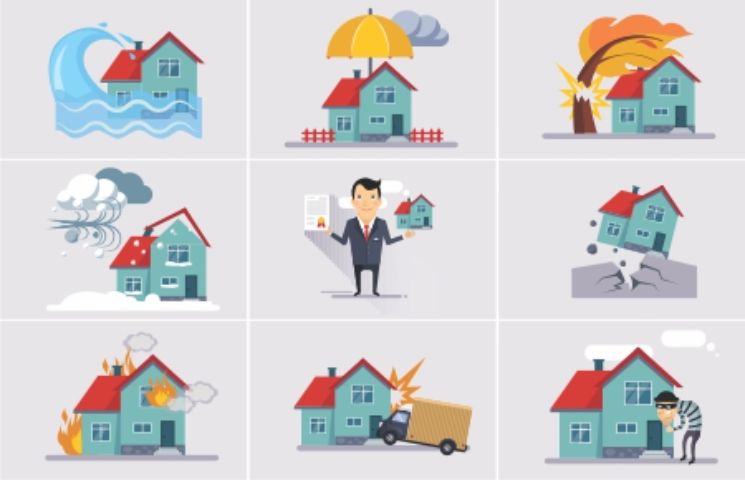Household Hazards Safety Tips
Household Hazards Safety Tips

Households are supposed to be safe with well-protected plans put in place. However, it may not be possible to have a plan without understanding the potential hazards and dangers that may come up in a household. This article focuses on the different potential sources of hazard in a household. By gaining an understanding of these potential dangers, you can take precautionary measures, including ensuring you have adequate home insurance coverage, to avoid further risks. Especially if you have children or older people living in the house, it is best to take precautionary measures and stay safe.
1. Exercise equipment
It is common to have different kinds of exercise equipment at home. Going to the gym can be time-consuming and also inaccessible to many. As a result, purchasing gym equipment and having them laid out at home has become a popular trend. Keep an eye on equipment and look for hazards like heavyweights, rotating belts, and others. For instance, rotating belts can be hazardous if left on.
2. Doors and windows
Make sure that your doors are tightly fixed and are not loose at their hinges. In addition, windows can also be a potential source of hazard. For instance, it can be safer to not install french windows as they can be easily opened by children and toddlers. The material of your doors and windows also matter as they determine the probability of hazard caused. In addition, try to reduce the use of brightening agents such as varnish on your door as they release toxic fumes.
3. Electronic appliances
All electronic appliances pose a certain degree of risk. A few appliances may pose a higher risk compared to others. Phone charges are cables left in the open without being unplugged can lead to electric shocks to people in the house. It is important to stay mindful and responsible with using and storing electronics.
4. Gas-Powered Space Heaters
Most often, the risks posed by gas-powered space heaters are neglected. They can potentially lead to health problems as a faulty heater can release carbon monoxide gas. When inhaled frequently and in large quantities, carbon monoxide can lead to serious health issues and can also be fatal during certain times.
5. Extension Cords
Keep your extension cords neatly wrapped up and properly insulated. Worn out extension cords and having wired lying around can be risky.
How can I avoid typical household hazards?
There are certain measures that you can follow to mitigate household hazards that may occur. Here are some ways in which you can avoid typical household hazards.
● Make sure that you store cleaning agents, fertilizers, pest control solutions, and other chemicals in a safe place that kids and infants cannot reach.
● Keep your stairways and other pathways well lit.
● Make sure that your floor is dry to avoid injuries and accidents.
● Keep an eye on the batteries of your smoke detectors.
● Ensure good functioning of your alarm system and sprinkler system.
● Verify the safety of wires in your house and make sure that none of them is damaged or have loose ends.
Other hazards to consider
In addition to common hazards, here are a few other hazards that you should be aware of so that you can stay safe.
● Being safe in the kitchen is important. Ensure good safety practices.
● Be safe while using sharp objects to avoid injuries.
● Store paint and other combustible materials in a safe space.
● Be cautious with appliances and electronics.
Regularly review your home for potential fire hazards
One of the ways to stay cautious and responsible is to regularly check your house for these potential hazards. By doing so, you can identify these hazards in the very beginning and prevent the risk from escalating. You can examine your electrical work, extension cords, and light bulbs to make sure that they are in good condition. You can also examine all the power outlets to make sure that they are properly insulated. It can also be helpful to store your kitchenware and other items safely.
Conclusion
There are many different sources of hazards in a household. It is important to stay aware of them and then take the necessary precautions. Meanwhile, make sure that you have a property insurance policy to protect you from any damages. You can follow a list of measures to avoid any risks in the household. These measures such as ensuring safe electricals, keeping chemicals in a safe location, and others can help you mitigate household hazards.
Disclaimer: The above information is for illustrative purpose only. For more details, please refer to policy wordings and prospectus before concluding the sales.
RELATED ARTICLES
Essential Safety Equipment Every House Should Have
Tips to Handle a Disaster at Home
Simple Yet Smart Ways to Secure your Home
Some Space Heater Safety Tips You Must Know
Know the Difference Between Hazard Insurance and Home Insurance










 Health Insurance
Health Insurance  Travel Insurance
Travel Insurance  Car Insurance
Car Insurance  Cyber Insurance
Cyber Insurance  Critical Illness Insurance
Critical Illness Insurance
 Pet Insurance
Pet Insurance
 Bike/Two Wheeler Insurance
Bike/Two Wheeler Insurance  Home Insurance
Home Insurance  Third Party Vehicle Ins.
Third Party Vehicle Ins.  Tractor Insurance
Tractor Insurance  Goods Carrying Vehicle Ins.
Goods Carrying Vehicle Ins.  Passenger Carrying Vehicle Ins.
Passenger Carrying Vehicle Ins.  Compulsory Personal Accident Insurance
Compulsory Personal Accident Insurance  Travel Insurance
Travel Insurance  Rural
Rural 











